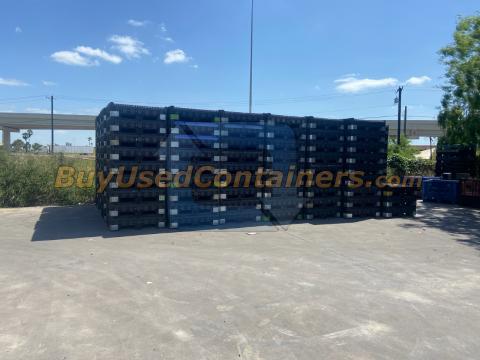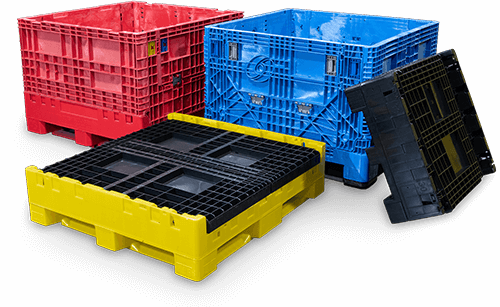A guide to choosing between used plastic containers and used collapsible containers for storage
Why Mass Containers Are Important for Economical and lasting Transportation
Bulk containers play an important duty in contemporary logistics. They assist in the effective movement of big quantities of goods, therefore enhancing transport processes. This approach not only reduces expenses however additionally reduces environmental impact via lower emissions and waste generation. As industries look for even more lasting practices, the fostering of bulk containers is coming to be progressively considerable. What effects does this shift hold for future logistics and supply chain management?

The Advantages of Making Use Of Bulk Containers in Logistics
Mass containers transform logistics by improving effectiveness and sustainability. These containers allow for the transport of huge quantities of goods in a solitary trip, significantly lowering the number of journeys required. This not just improves procedures but also reduces labor costs connected with handling, loading, and dumping. In enhancement, mass containers are made to optimize room usage within transport lorries, making sure that more products can be delivered all at once.
The standardization of bulk containers additionally simplifies the logistics procedure. With consistent dimensions, they can be conveniently piled and stored, leading to improved stockroom monitoring. Bulk containers usually include durable products that secure components from damages during transit, thereby lowering item loss and enhancing overall integrity. Consequently, organizations can experience boosted supply chain performance, inevitably resulting in increased success and customer complete satisfaction. This mix of factors makes mass containers an essential asset in contemporary logistics.
Ecological Impact: Decreasing Waste and Carbon Footprint
As sectors significantly prioritize sustainability, the fostering of bulk containers has become a crucial approach for reducing waste and lowering carbon impacts. These containers minimize making use of product packaging materials, such as boxes and plastic, consequently notably lowering overall waste generation. By settling deliveries, mass containers boost transport efficiency, enabling for even more products to be carried per trip. This decrease in journeys directly associates with lower greenhouse gas exhausts, adding to a smaller sized carbon impact.
Additionally, mass containers can typically be reused or reused, better reducing ecological influence. The sturdiness of these containers assurances they can withstand multiple transport cycles, lowering the requirement for single-use choices. refurbished bulk containers. By simplifying logistics and promoting effective resource usage, bulk containers not only sustain sustainable practices yet likewise motivate sectors to straighten with global environmental goals. Eventually, their implementation shows a commitment to eco-friendly stewardship and responsible source administration
Cost Financial Savings: Exactly How Mass Containers Lower Transport Expenditures
While lots of firms look for methods to enhance their lower line, making use of bulk containers offers a considerable possibility for decreasing transportation costs. Mass containers make best use of the volume of products delivered, permitting businesses to ship bigger amounts at the same time. This effectiveness decreases the number of journeys needed, directly decreasing fuel costs and minimizing labor costs connected with loading and dumping.
In addition, bulk containers commonly include streamlined styles that maximize space usage within transport lorries. This indicates less voids, leading to a lot more effective use of readily available capacity. Furthermore, the sturdiness of bulk containers can lower the threat of item damages throughout transportation, making certain and reducing losses that more products arrive intact.
Enhancing Supply Chain Efficiency With Mass Storage Solutions
Bulk storage space services play an essential role in enhancing supply chain efficiency by enhancing stock administration. By settling goods into fewer, bigger containers, companies can considerably reduce handling costs connected with frequent transfers and handling. This structured method enables much better monitoring and management of inventory, eventually bring about improved operational efficiency.
Structured Stock Monitoring
Effective stock monitoring is essential for enhancing supply chain procedures, specifically when companies embrace bulk storage space remedies. These solutions make it possible for services to maintain higher supply degrees while reducing the regularity of replenishment. By combining materials into bulk containers, firms can simplify their supply procedures, lowering the complexity connected with tracking several smaller sized bundles. This strategy facilitates accurate inventory matters and enhances forecasting accuracy, permitting even more informed decision-making. In enhancement, mass storage services streamline storehouse organization, making it much easier to find and access items when required. Consequently, organizations can achieve a more effective supply turn over price, ultimately boosting overall supply chain performance and decreasing the likelihood of stockouts or overstock situations.

Reduced Handling Prices
The execution of bulk storage remedies not just streamlines stock management but likewise significantly reduces managing costs across the supply chain. By settling products right into mass containers, business reduce the demand for regular handling and transfer between various storage and transport devices. This strategy reduces labor expenses linked with loading, dumping, and relocating smaller sized bundles. Additionally, mass storage space minimizes the frequency of deliveries, causing lower transportation prices and reduced fuel intake. Because of this, services can optimize their logistics operations, allowing for an extra efficient allowance of sources. Inevitably, lowered dealing with expenses add to boosted overall supply chain performance, promoting a setting that supports both sustainability and financial viability.

Versatility of Bulk Containers Throughout Different Industries
Although lots of markets have unique needs for transportation and storage, mass containers have actually become a flexible remedy that meets a wide variety of requirements. These containers, varying from large containers to specialized containers, can fit diverse materials, consisting of powders, granules, and fluids. In the farming market, mass containers facilitate the transport of grains and plant foods, while the food and beverage market utilizes them for ingredients and finished items. The chemical market relies on mass containers for securely transporting dangerous materials, making sure conformity with safety guidelines. Additionally, building and construction firms benefit from bulk containers for transferring aggregates and various other products. Their here versatility encompasses different modes of transportation, consisting of trains, trucks, and ships, boosting logistical efficiency. This adaptability not just streamlines operations across various industries yet also advertises sustainability by reducing product packaging waste and enhancing space en route. As a result, bulk containers play a necessary function in contemporary supply chain management.
Future Trends in Bulk Container Usage and Sustainability
The future of mass container usage is significantly formed by ingenious materials growth that boosts sustainability. Furthermore, automation in logistics assures to enhance operations, minimizing waste and boosting efficiency. Accepting round economic climate practices will certainly further change just how bulk containers are made, used, and recycled, promoting an extra lasting transportation landscape.
Innovative Materials Advancement
As markets significantly prioritize sustainability, ingenious materials growth in bulk containers becomes a considerable consider improving environmentally friendly transportation solutions. Manufacturers and researchers are checking out eco-friendly plastics, recycled compounds, and light-weight metals to minimize ecological impact. These materials not only minimize waste however also boost gas performance by decreasing the total weight of containers. Furthermore, improvements in smart products, which can adapt to varying conditions, boost the longevity and functionality of bulk containers. The integration of these ingenious products straightens with round economic climate principles, advertising reuse and recycling. As the demand for sustainable methods grows, the advancement of such products will play an essential function in shaping the future of bulk container usage in logistics and transport.
Automation in Logistics
Substantial advancements in automation are poised to transform logistics and the utilization of bulk containers, improving sustainability in transportation. Automated systems, consisting of drones and independent cars, are simplifying the activity of bulk containers, decreasing the reliance on conventional fuel-powered transportation. These technologies optimize directing and loading processes, decreasing empty miles and improving fuel efficiency. Additionally, automated stock monitoring systems enhance monitoring and monitoring of bulk containers, making sure better resource appropriation and minimized waste. The combination of the Net of Things (IoT) enables real-time information analysis, allowing aggressive decision-making that lines up with sustainability goals. As automation proceeds to evolve, it is expected to drive better developments wholesale container use, eventually supporting more lasting logistics practices and minimizing the ecological impact of transport.
Round Economy Practices
Developments in automation are establishing the phase for a more incorporated strategy to circular economy methods in the domain name of mass container use. As markets progressively accept sustainability, mass containers are being created for durability and reusability. This shift not just lessens waste however likewise boosts resource efficiency. Business are embracing techniques such as closed-loop systems, where utilized containers are collected, reconditioned, and reestablished into the supply chain. Furthermore, clever modern technologies track container life process, helping with much better monitoring and minimizing environmental influence. The collaboration between manufacturers, logistics suppliers, and end-users is vital in establishing criteria for lasting container usage. used plastic containers. Future trends suggest an expanding emphasis on products that are recyclable and eco-friendly, further enhancing the round economy's principles in bulk transport

Frequently Asked Inquiries
What Products Are Mass Containers Normally Made From?
Mass containers are normally built from long lasting materials such as high-density polyethylene, light weight aluminum, steel, and cardboard. These products provide security, convenience, and stamina, making them ideal for carrying numerous items in different sectors successfully.
Just how Do I Pick the Right Size Bulk Container?
Selecting the ideal size mass container includes examining the quantity of materials to be transported, taking into consideration handling equipment compatibility, and evaluating storage area demands. Correct size guarantees performance in transportation and minimizes waste throughout shipment.
Are Bulk Containers Reusable or Recyclable?
Bulk containers are typically reusable, designed for numerous trips, boosting sustainability. Lots of can also be recycled, relying on the materials utilized. Choosing recyclable options better lowers and supports environmental objectives waste in transportation techniques.
What Security Laws Apply to Mass Container Transportation?
Safety and security regulations for mass container transportation consist of compliance with the Department of Transport standards, appropriate labeling of hazardous products, structural honesty evaluations, and adherence to weight limits to assure safe handling and protect against mishaps during transportation.
How Can Organizations Change to Utilizing Mass Containers Efficiently?
Services can change to bulk containers by reviewing present logistics, training staff on handling, purchasing appropriate equipment, optimizing supply administration, and working together with suppliers to assure compatibility and effectiveness throughout the supply chain.
As industries increasingly focus on sustainability, the adoption of mass containers has emerged as a vital method for decreasing waste and decreasing carbon impacts. By consolidating materials right into bulk containers, firms can improve their supply procedures, reducing the intricacy associated with tracking numerous smaller packages. As sectors progressively prioritize sustainability, cutting-edge materials growth in bulk containers emerges as a substantial factor in improving green transport solutions. Automated systems, including drones and autonomous automobiles, are streamlining the activity of bulk containers, minimizing the dependence on conventional fuel-powered transportation. Additionally, automated stock monitoring systems enhance tracking and monitoring of mass containers, ensuring far better resource appropriation and reduced waste.